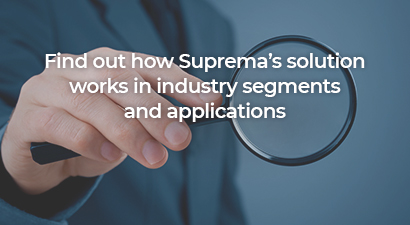- PRODUCTS
- PLATFORM
- BioStar 2 Access Control
- BioStar Air Access ControlNEW
- BioStar 2 Time and Attendance
- Suprema Mobile Access
- HARDWARE
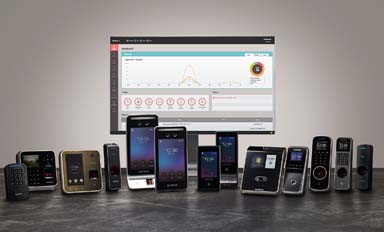
- Biometric Readers
- RF/ Mobile Readers
- Intelligent Controller
- Peripherals
- OEM Biometric Modules
- Wireless Door Locks
-
Discontinued Products
- 4 Door Kit
- FaceLite
- BioStation A2
BioMini Plus 2
- BioStation 2
- OMNIS
X-Station 2(XS2-QAPB, XS2-QDPB)
- BioStation L2
- SOLUTIONS
- SUPPORT
- ABOUT
- device_hubHUB
- Blogs & Articles
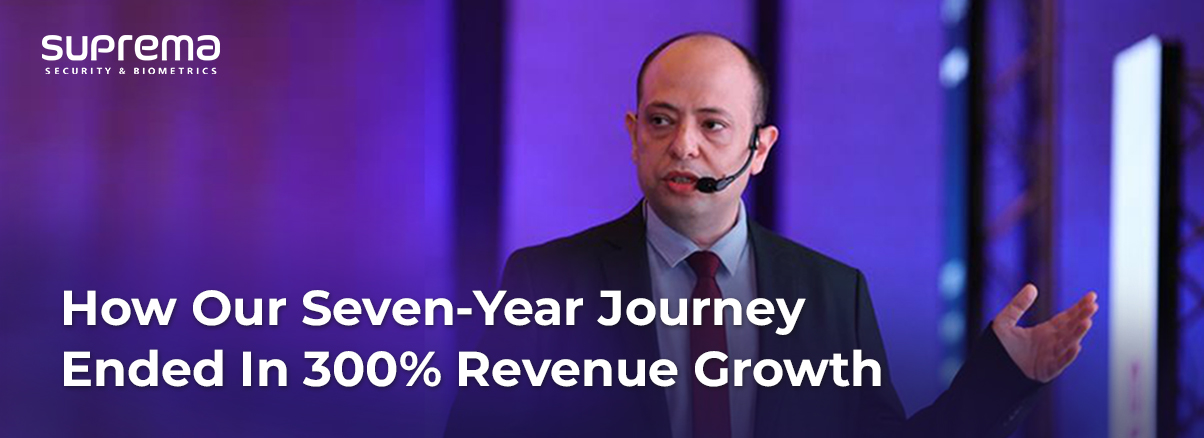
The Fastest and Most Accurate Facial Recognition Devices
a&s Middle East: With the launch of BioStation 3, you introduced advanced features like AI‑optimized speed, anti‑spoofing, secure element technology, and IP protection. How do these certifications and features work together to ensure trust and safety?
ElShenawy: Suprema has been well known in the market for the fastest, most reliable, and most accurate facial recognition devices. Having its own facial rec-ognition algorithm matcher and being a very reliable hardware manufacturer has made Suprema self-dependent with no limitations. Suprema’s AI-powered facial authentication device, BioStation 3, is equipped with both infrared (IR) and RGB cameras. This dual-sensor approach ensures highly accurate authentication, fur-ther enhanced by Suprema’s AI algorithms developed by the in-house R&D team. Suprema is conducting extensive testing and training using various models, includ-ing printed photos and video captures, to continuously improve the accuracy of its AI-powered facial authentication. BioStation 3 is now our best revenue-generating product in our assigned territory. As a great value-for-money product, it allows our customers to receive the best technology at a very reasonable price. BioSta-tion 3 is not just a facial recognition device since it has many unique features that set it far ahead of the competition, such as mobile credentials, VoIP SIP protocol, outdoor-ready IP65, PoE, and support for all types of access cards, including MIFARE, MIFARE DESFire, HID iCLASS, and HID SEOS.
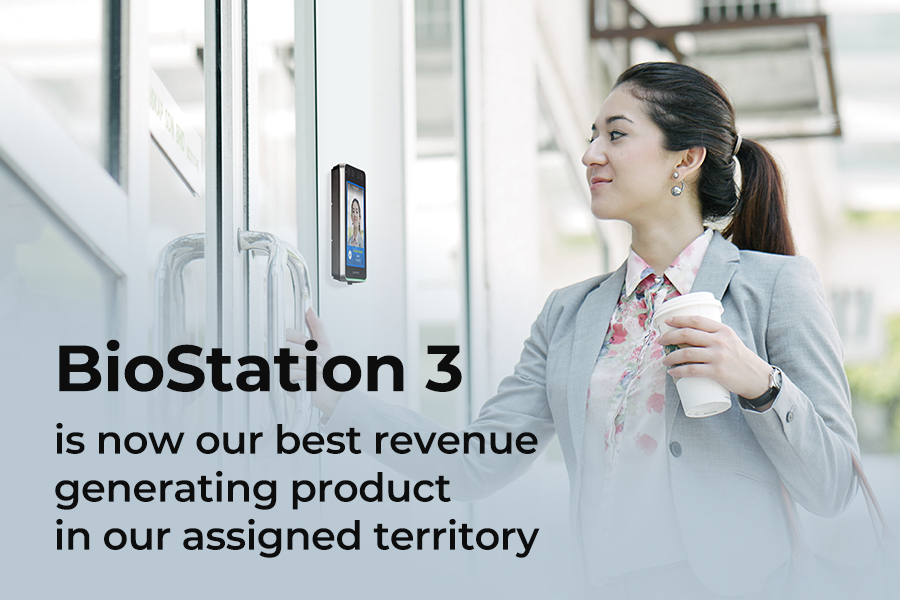
a&s Middle East: Could you please share some background about yourself, your career path, and your current role at Suprema?
ElShenawy: My name is Mohamed ElShenawy, and I’m the Managing Direc-tor at Suprema Middle East FZCO. I’m responsible for our operations across the META region and CIS countries, which includes the Middle East, Turkey, Africa, and the CIS.
a&s Middle East: How would you de-scribe Suprema’s business operations and strategy in the Middle East? What have been the key successes or chal-lenges in that region?
ElShenawy: Suprema Inc. established the Suprema Middle East office as a subsidiary back in July 2017. At this time, we were fully dependent on our distribution channels in the Middle East, with no direct interactions with end users, and we were not present in all the market segments. We con-ducted a complete market gap analysis and the areas for improvement with an action plan. That was the beginning of Suprema Middle East’s success story. The sales revenue generated by Suprema Middle East has grown by 300% over the past seven years of hard work, which led our headquarters, Su-prema Inc., to recognize us as a very reliable and target-oriented regional of-fice. Looking at the numbers and the achievements made, Suprema Inc. decided to assign additional countries to Suprema Middle East starting in 2025, namely Africa, Turkey, and the CIS countries. So, our coverage has ex-panded from the Middle East to META + CIS, i.e. Middle East, Turkey, Africa, and the CIS. One of the key factors be-hind our success is being located in the Dubai Airport Freezone in the UAE, which provides flexibility, accessibility, and ease of importing and exporting goods across our assigned region.
a&s Middle East: In the Middle East, which countries currently account for the majority of Suprema’s projects, em-ployees, or service centers? In which markets or verticals within the region
are you seeing the strongest perfor-mance, and why?
ElShenawy: Most of our Suprema Mid-dle East employees are based in Dubai, UAE, mainly because of the time zone and the flexibility of the hiring process. Today, Suprema META + CIS has built a very strong presence across a wide range of segments, including govern-ment institutions such as ministries, authorities, and embassies, as well as oil and gas, education, healthcare, and banking. We are also active in residen-tial complexes, construction sites, data centers, manufacturing plants, sports clubs, transportation hubs like airports and seaports, and retail chains.
a&s Middle East: You recently un-veiled the BioStar Air platform, embed-ding biometric processing at the edge to ensure fast and reliable access even during network outages. Could you ex-plain how this edge-based architecture balances convenience, security, and cross-site consistency for users?
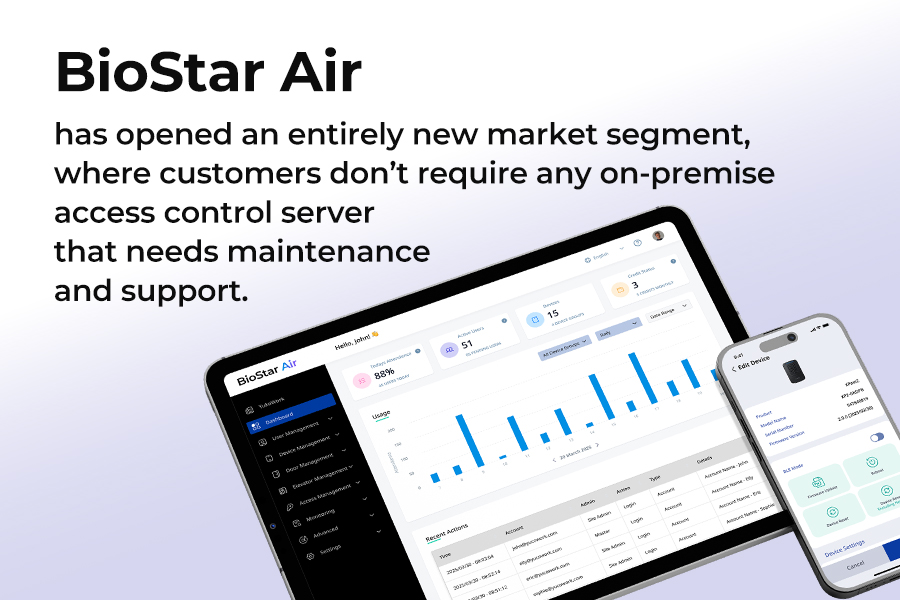
ElShenawy: BioStar Air has opened an entirely new market segment, where customers don’t require any on-premise access control server that needs main-tenance and support. BioStar AIR re-quires no servers to set up and no soft-ware to install. Your site can be online in minutes and fully configured in about an hour. BioStar Air is the only access control solution that natively connects the world’s most advanced biometric readers to the cloud. Cloud-based bi-ometrics offer secure, scalable, and instant access across multiple locations without physical credentials.
a&s Middle East: Suprema has re-cently renewed compliance with the lat-est ISO/IEC 27001:2022 and ISO/IEC 27701 standards, while also maintain-ing CSA STAR certification. Could you discuss how these updated security and privacy frameworks enhance cus-tomer trust, especially in an era dominated by AI and cloud-driven security challenges?
ElShenawy: Suprema is always keen to obtain all required certifications to comply with regional requirements, differentiate our products, and stay ahead of our competitors. Having ISO/IEC 27001:2022 and ISO/IEC 27701 standards, as well as maintaining CSA STAR certification, has made our cus-tomers very confident in choosing Su-prema products across different seg-ments where these certificates are mandatory, such as government, oil and gas, and the banking sector.
a&s Middle East: Your open cloud in-tegration platform, CLUe, is designed to support multi-credential authentica-tion and centralized management. How does CLUe simplify access control for modern businesses, and what advan-tages does its cloud‑first architecture offer compared to on-premise systems?
ElShenawy: Suprema CLUe is an open cloud integration platform built on a na-tive cloud architecture, eliminating the need for an on-premises server. Devices connect directly to the cloud, supporting pure cloud-to-cloud server-level integra-tion using standard REST APIs. CLUe enhances security by leveraging Suprema’s biometric access control devices and offers a mobile application or web por-tal for easy management and technical support. It is ideal for various member-ship management services, such as resi-dential complexes, visitor management, fitness centers, shared offices, and mul-ti‑branch offices. This allows CLUe cus-tomers to focus more on their business while receiving direct support to meet all their access control needs.
a&s Middle East: Suprema’s Template on Mobile technology allows users to securely store and manage their facial authentication data directly on their phones. How does this approach address growing privacy concerns and regulatory requirements, and what op-erational benefits does it offer to both users and administrators?
ElShenawy: Template on Mobile (TOM) technology is a very unique feature that Suprema provides. It allows Suprema bi-ometric users to store their facial tem-plates on their own mobile phones. This ensures full compliance with the Gener-al Data Protection Regulation (GDPR), so no biometric data is stored on our devices or on our BioStar 2 access con-trol and time attendance server. This TOM feature is widely used in the Eu-ropean market, where GDPR-compliant solutions are a must.
a&s Middle East: Suprema’s collabora-tion with Hyundai Motor Group aims to pioneer AI-driven, robot-friendly building security solutions that integrate facial authentication with autonomous robot-ics. How do you envision this partnership transforming the future of physical secu-rity, and what new applications do you foresee emerging from this synergy?
ElShenawy: Suprema’s collaboration with Hyundai Motor Group aims to revo-lutionize the robot-friendly building se-curity business by combining AI access control and robotics. Together, Supre-ma and Hyundai Motor Group Robotics LAB have already successfully developed and deployed a security solution that integrates Suprema’s AI-based facial authentication access control technol-ogy with autonomous robots at Factorial Seongsu, Korea’s first commercialized robot-friendly building. Building on this success, the companies plan to focus on the continued development of new secu-rity services, including the implementa-tion of specialized security form factors using robotics hardware and software technologies to further enhance physical security.
a&s Middle East: Suprema AI has de-veloped Q-Vision Pro, an on-device AI module that uses facial recognition and behavior analysis to predict and prevent financial crimes at standalone ATMs. How does this technology enhance se-curity for financial institutions, and what challenges does it address?
ElShenawy: The Q-Vision Pro is the world’s first on‑device AI module that predicts and prevents rapidly increasing financial crimes using facial recognition and behavior analysis around standalone devices such as ATMs. By analyzing sus-picious actions and utilizing facial recog-nition, it predicts potential crimes and prevents illegal transactions, protecting both customers and banks. Capable of handling up to 50,000 users with pow-erful multi-layer data encryption, it op-erates securely even when independent of a network. Suprema AI, recognized among Korea’s top 100 emerging AI firms in 2024 and recipient of the Min-ister of Science and ICT Award in 2023, contributes to a safer world.
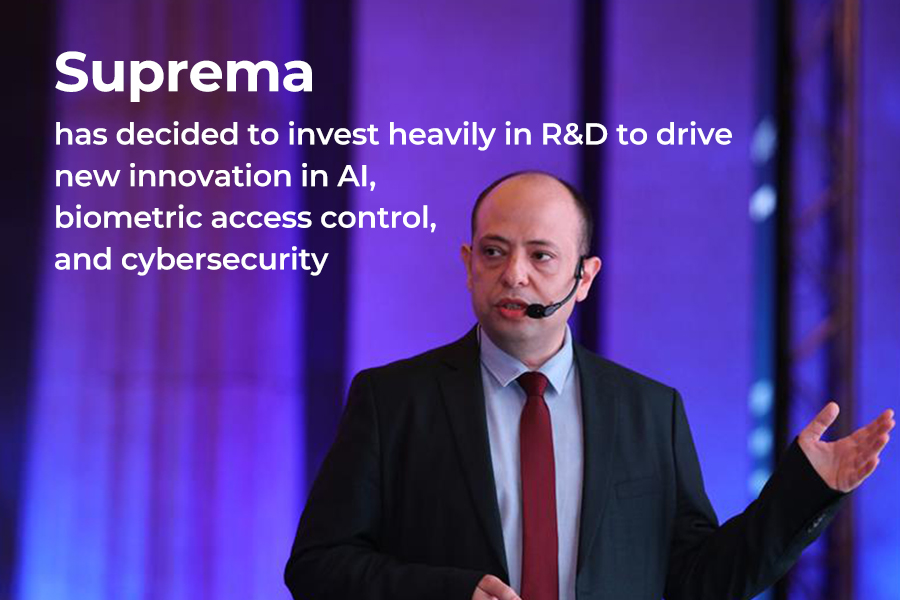
a&s Middle East: What can custom-ers and partners expect from Suprema in the near future in terms of techno-logical innovation, market expansion, and new security solutions? Are there any specific trends or areas where Su-prema plans to introduce new develop-ments?
ElShenawy: Suprema has very robust expansion plans, mostly focusing on enhancing our access control platform by providing new features to serve market needs, address the enterprise market, and win giga-sized projects. The rapid evolution of generative AI is introducing significant challenges to physical security, with deepfakes emerging as a primary concern. These AI-generated creations can realisti-cally mimic human faces, voices, and even fingerprints, posing a substantial threat to biometric authentication sys-tems that have long been considered highly secure methods of access con-trol. Suprema has decided to invest heavily in R&D to drive new innovation in AI, biometric access control, and cy-bersecurity.

